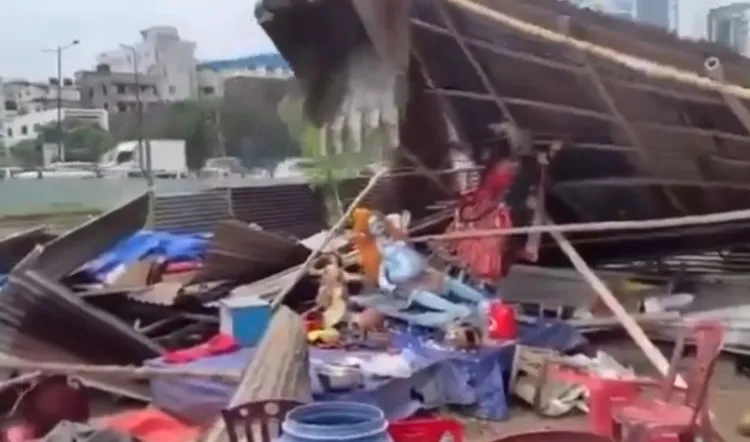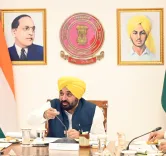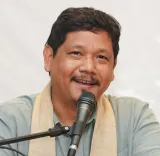Has India Condemned the Yunus Government in Bangladesh for Demolishing a Durga Temple?

Synopsis
Key Takeaways
- India condemns the demolition of the Durga temple.
- Yunus-led government accused of failing to protect minorities.
- Rising concerns over Hindu community safety in Bangladesh.
- Pattern of violence against Hindus continues.
- International scrutiny on Bangladesh's minority treatment.
New Delhi, June 26 (NationPress) India voiced strong condemnation on Thursday regarding the demolition of the Durga Mandir in Dhaka, criticizing the Muhammad Yunus-led interim government for permitting this destruction while labeling it a matter of illegal land use.
"We acknowledge that extremists were calling for the demolition of the Durga temple located in Khilkhet, Dhaka. Instead of ensuring the temple's protection, the interim government portrayed this incident as an issue of illegal land use, which facilitated the temple's destruction today," stated the Ministry of External Affairs (MEA) spokesperson, Randhir Jaiswal, during a weekly media briefing in New Delhi.
"This has led to damage to the deity before its relocation. We are troubled that such incidents persist in Bangladesh. It is crucial to emphasize that the interim government of Bangladesh bears the responsibility of safeguarding Hindus, their properties, and their religious sites," he expressed.
Earlier this week, the Human Rights Congress for Bangladesh Minorities (HRCBM) spotlighted another incident, condemning the vandalization of a Mahastri Manasa and Durga Temple in the Dinajpur district, which was perpetrated by miscreants as a shocking act of terror against the Hindu minority in the region.
"The attackers desecrated the temple, destroyed idols, and decapitated the idol of Goddess Manasa — an act of severe sacrilege intended to demean the minority community and instill terror. As the assailants escaped, they threatened local Hindus with further violence, promising to kill community members at the next chance," read a statement from the HRCBM.
"The entrenched fear among Bangladesh's Hindu community — fueled by years of targeted violence, social marginalization, and systemic failures — was painfully apparent in this instance," it added.
India has adopted a stern stance on the rights of the Hindu minority, repeatedly asserting that there is a "systematic persecution of Hindu minorities" under the Yunus-led interim government in Bangladesh.
In response to another inquiry regarding the recent trilateral meeting involving China, Pakistan, and Bangladesh in Kunming, the MEA spokesperson mentioned that New Delhi remains vigilant regarding developments in the neighborhood that impact the nation’s interests and security.
"We consistently monitor developments in our vicinity that bear upon our interests and security. Our relations with individual countries, while standing independently, also consider the evolving context," he noted.
The inaugural trilateral meeting took place in China’s southern Yunnan province on June 19, where the three countries reaffirmed their commitment to a "shared" future.
During the meeting, the three parties also agreed to bolster their cooperation to enhance regional connectivity and deepen collaboration across various fields, including trade and investment, agriculture, digital economy, environmental protection, marine sciences, green infrastructure, culture, education, and people-to-people exchanges.
Bangladesh's increasing engagement with China and Pakistan under the Yunus interim administration is quite prominent, especially following the ousting of former Prime Minister Sheikh Hasina in August 2024.
For decades, relations between Dhaka and Islamabad were tense and adversarial. However, under Yunus's leadership, there is a noticeable improvement in the Bangladesh-Pakistan relationship.
Analysts suggest that Pakistan is capitalizing on the situation by integrating its non-state actors within Bangladesh, mingling them with Rohingya refugees, and collaborating with radical Islamist factions to promote anti-India activities.





